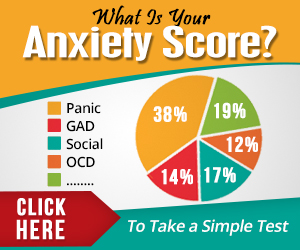For many people who deal with anxiety and panic attacks on a regular basis, nighttime can be a particularly difficult time of day because they are unable to fall asleep naturally. Not getting enough sleep can take its toll on your health and well-being, and can even increase the risk of an anxiety or panic attack in the near future. People stay awake at night for a number of reasons. They may be fearful or worried about an upcoming event, or they might simply be worried that they can’t sleep and won’t be able to perform at their best the
Read more
Alleviating mental anxiety you experience upon waking isn’t always easy. How often do you get up in an anxious state? Do you feel calm and well-rested when you first wake up, or is your mind just reeling with thoughts and ideas? If you suffer from frequent anxiety attacks and panic attacks, it’s likely that you experience a high level of stress and anxiety shortly after waking. The good news is, you can use this energy in a positive way and clear out those mental blocks before you tackle the day ahead. Julie Cameron talks about writing “Morning Pages” in her
Read more
Click play to hear Barry explain this anxiety sensation. Sometimes people who are making good progress with their anxieties experience a setback when they come down with either a head cold or the flu. The reason for this is because, as the body wards off the cold or flu, it makes the people feel drained and vulnerable. To people with anxiety, this can feel unnerving because it may remind them of how they felt during an intense spell of anxiety. Colds and flu also come with an almost claustrophobia-like sensation of being congested up in your head. Try to remember
Read more
Click play to hear Barry explain this anxiety sensation. There are a number of different phobias related to the toilet, but here I’m going to discuss one of the most common: the fear of not getting to the toilet on time. No one should feel ashamed of this problem; it’s common and can be overcome. This fear is almost always connected to social embarrassment, and it rarely happens in situations where other people are not around. Anxiety can give people the impression that they have a weak bladder. When anxious, they may need to use the toilet several times. In
Read more
Click play to hear Barry explain this anxiety sensation. When panic attacks begin, people often feel a tingling sensation in their body. The medical term for this is paresthesia. More generally known as the feeling of pins and needles, it’s a sensation of tingling, pricking, or numbness of the skin, and it has no apparent long-term physical effect. Paresthesia is most commonly felt in the hands, arms, mouth, and feet. Don’t be alarmed; this is perfectly natural to experience in connection with high anxiety.
Read more
Click play to hear Barry explain this anxiety sensation. Anxiety creates the sensation of weak or “jelly” legs. When anxious, adrenaline is released into your body. The adrenaline can make sensitive people feel very weak in their muscles—especially the leg muscles, because they’re supporting the body. You often hear people say that when they have to stand up and speak, they go weak at the knees and fear they might topple over. It’s important to note, however, that the jittery sensation you may feel in your legs is not a signal that your legs are any weaker—they’re not. In fact,
Read more
Click play to hear Barry explain this anxiety sensation. When frightened or anxious, the pupils in the eye dilate quickly, and this can sometimes cause blurred vision. Blurred vision can also occur when looking quickly between near and far objects, because the pupils change dimension. Blurred vision is also often caused by fatigue or when the eye muscles start to lose elasticity with age. Even though anxiety can frequently cause instances of blurred vision, it’s important to visit your doctor for an eye checkup. For example, if the blurred vision occurs with a discharge, it may be conjunctivitis and need
Read more
Click play to hear Barry explain this anxiety sensation. If you experience high anxiety or stress, it’s very likely that you also experience headaches, or even migraines. Some describe their headaches as dull pain or a tight band around their heads. A migraine is usually experienced in more severity, sometimes associated with sensitivity to light, sound, and movement. The most common of all the various headache types is a tension headache. This is caused by a tightening of the muscles in the upper back, neck, and head. Many cite anxiety as a major trigger for this type of headache. Researchers
Read more
Click play to hear Barry explain this anxiety sensation. Here’s a typical scenario of getting anxious about your heart: “While sitting at my desk, I was feeling edgy, and I could feel my pulse rate increase. I kept working, and then I felt pins and needles going up my left arm. I immediately thought to myself, “I’m having a heart attack.” Literally seconds later, my heart was racing. I then looked around to see if there was anyone at the office. I was by myself . . . I really thought I was having a heart attack or stroke. Knowing
Read more
Click play to hear Barry explain this anxiety sensation. Anxiety has a direct impact on the abdominal region. It can make people feel anything from a mild jittery sensation (butterflies in the stomach) to physically sick. Most people tend to get more anxious when they imagine they might vomit, and that worsens the sensation of anxiety, making it all the more likely to happen. The fear of getting sick makes the situation worse. This fear is driven by thoughts like this: What if I get sick right here and now? What would I do? What would people think of me?
Read more
It is common to feel tension around the throat area during an episode of anxiety. This is caused by the muscles of the throat contracting and can give the person the sensation there is a lump in their throat. The medical term for this is globus hystericus. For people who experience this in association with eating, I find that it’s the thought of forcing a swallow that causes them to feel anxious. If you feel very uncomfortable while eating, the best approach is to simply chew your food and make no attempt to swallow. Just keep chewing. You’ll find that
Read more
Click play to hear Barry explain this anxiety sensation. When someone experiences high anxiety or panic, it’s very common to feel light-headed or dizzy. This sensation is alarming because it makes you feel very vulnerable. If you’re alone, you might fear falling in unconsciousness with no one to look after you. Or if the sensation happens in public, it can lead to feelings of vulnerability surrounded by strangers. The dizziness often felt during an episode of anxiety is caused by increased respiration. People tend to overbreathe, or hyperventilate, when they’re anxious, which can lead to dizziness or light-headedness. Dizziness can
Read more




